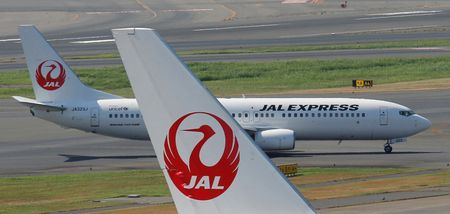BEIJING (Reuters) -China’s export growth slowed in the January-February period largely due to base effects, and though the data beat expectations, Russia’s invasion of Ukraine has heightened uncertainty over the outlook for global trade this year.
Outbound shipments rose 16.3% in the first two months of the year from the same period a year earlier, official data showed on Monday, beating analyst expectations for a 15.0% rise, but down from 20.9% gain in December.
Imports increased 15.5%, easing from a 19.5% gain in December and below the forecast 16.5% increase.
The customs agency publishes combined January and February trade data to smooth distortions caused by the Lunar New Year, which can fall in either month.
Factory activity normally slows considerably during the long holiday as workers return to their home towns. But for the third year in a row, many factory workers did not return home because of concerns about COVID-19, which kept some factories operating.
“These numbers will probably be well received. China’s exports are high and also the imports are continuing,” said Louis Kuijs, Asia Pacific chief economist at S&P Global Ratings, adding that exports remain one component of the economy still supporting growth.
“We need to see how long the economic impact (from the Ukraine crisis) will last. China’s economy overall is big and should be to able to continue to grow even in the face of external shocks but export growth will be affected.”
China’s booming exports outperformed expectations for much of last year and buoyed growth in the world’s second-largest economy, but analysts expect shipments to slow eventually as overseas demand for goods eases and high costs pressure exporters.
Russia’s invasion of Ukraine late last month, which it calls a “special operation”, and mounting international sanctions against Moscow have raised fresh risks for the global economy, adding to months-long strains for China’s factories from worldwide supply chain snags.
Tian Yun, former vice director of the Beijing Economic Operation Association, expects China-Europe trade may be disrupted due to the conflict in Ukraine.
“If the Ukraine crisis halts China-EU freight train services or leads to a slower operation efficiency, there will be adverse impact to EU and China’s trade. This might be the biggest risk,” Tian said.
Chinese exporters with exposure to Ukrainian markets have delayed shipments, while some factories with business in Russia have been waiting for payment from their clients before arranging the next shipments, factory officials and analysts told Reuters.
China’s exports to Russia surged 41.5% in the first two months of the year, topping growth with other countries, customs data showed on Monday, while imports from Russia rose 35.8%.
IMPORTS
Lian Weiliang, a vice head at the National Development and Reform Commission, expects the overall cost issues for importers to remain manageable despite rising energy prices driven by the Ukraine crisis.
“The source of China’s crude oil and natural gas imports is diverse, with long-term contracts accounting for a large proportion of all deals,” Lian said at a news conference. “As long as all parties comply with the contracts, imports can remain stable.”
Analysts say higher prices for energy and agricultural products would provide a boost to the country’s imports value for the months to come.
“As domestic infrastructure investment kicks in, the demand for energy commodities will continue to expand,” said Chang Ran, senior researcher at Zhixin Investment Research Institute.
“The Russia-Ukraine conflict may cause prices of crude oil, natural gas, wheat and others to soar for a period of time. The price factor could bolster imports.”
Beijing has targeted slower economic growth of around 5.5% this year amid an uncertain global recovery and a downturn in the country’s vast property sector. While that would mark a sharp slowdown in annual growth, it is nonetheless an ambitious target that would require more policy support, analysts say.
(Reporting by Stella Qiu, Ellen Zhang and Ryan Woo; Editing by Sam Holmes and Raju Gopalakrishnan)











